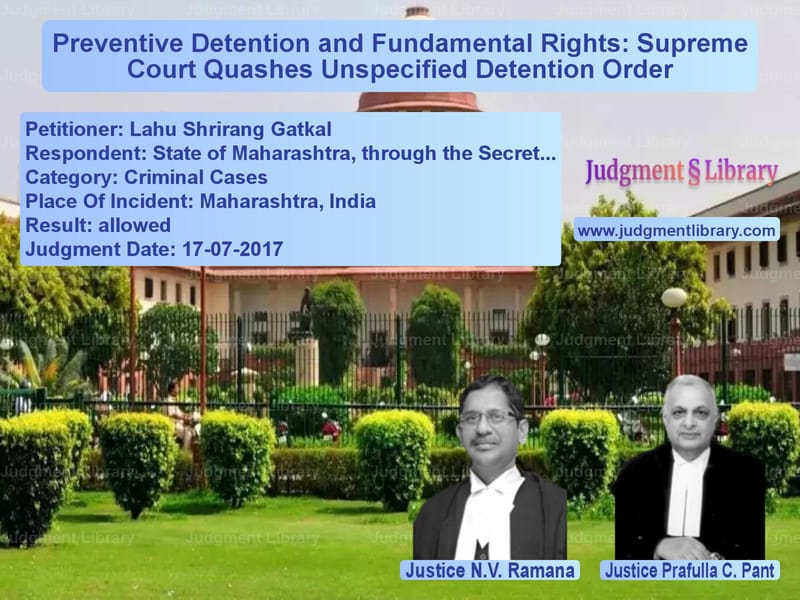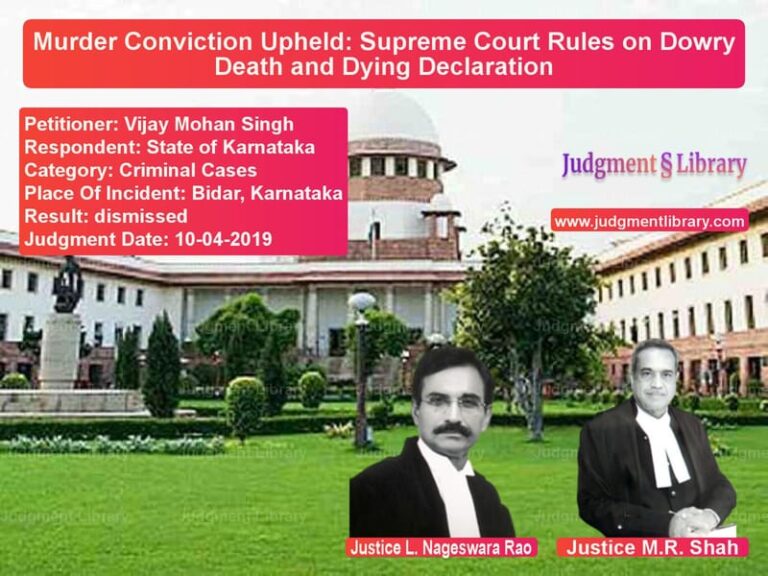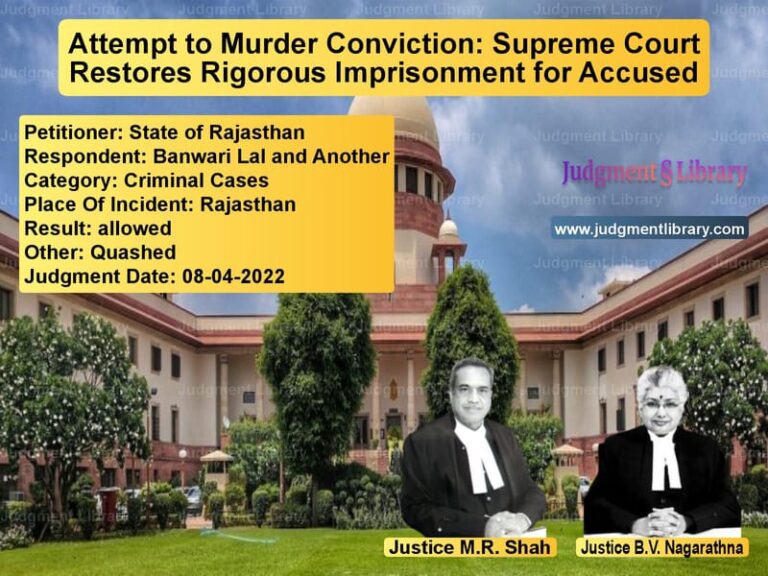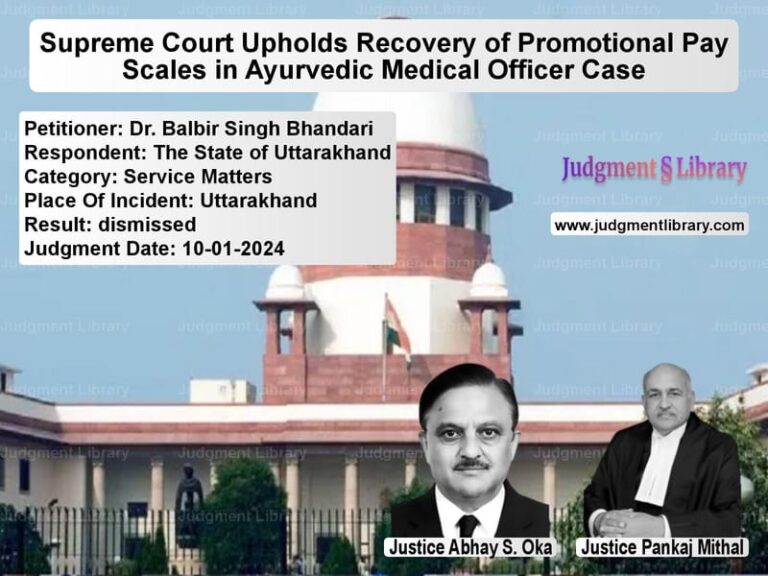Preventive Detention and Fundamental Rights: Supreme Court Quashes Unspecified Detention Order
The Supreme Court of India recently ruled in favor of Lahu Shrirang Gatkal, setting aside his preventive detention under the Maharashtra Prevention of Dangerous Activities of Slumlords, Bootleggers, Drug Offenders, Dangerous Persons, Video Pirates, Sand Smugglers, and Persons Engaged in Black Marketing of Essential Commodities Act, 1981. The case revolved around the validity of a detention order that did not specify a fixed period of detention. This judgment reaffirms constitutional protections against arbitrary detention and upholds the principles of due process.
Background of the Case
Lahu Shrirang Gatkal, a police constable in Maharashtra, was accused of engaging in criminal activities, including offenses under various sections of the Indian Penal Code (IPC). Due to his alleged involvement in activities deemed prejudicial to public order, the Commissioner of Police issued a preventive detention order against him on October 10, 2016. However, the order did not specify the period for which Gatkal was to be detained.
Gatkal challenged the order before the Bombay High Court (Aurangabad Bench) in Criminal Writ Petition No. 132 of 2017. The High Court dismissed his petition, prompting him to file an appeal before the Supreme Court.
Arguments of the Petitioner (Lahu Shrirang Gatkal)
The petitioner, represented by his counsel, put forth the following arguments:
- The detention order was unconstitutional as it failed to specify the period of detention, violating his fundamental rights under Article 21 of the Indian Constitution.
- The Maharashtra Prevention of Dangerous Activities Act mandates that the period of detention be specified in the order, with an initial maximum duration of six months.
- The High Court erred in dismissing his writ petition without considering the legal flaw in the detention order.
- In the case of Cherukuri Mani v. Chief Secretary (2015), the Supreme Court had ruled that a detention order without a specified period is invalid.
Arguments of the Respondent (State of Maharashtra)
The State of Maharashtra defended the detention order, stating:
- The petitioner had a history of criminal activities and posed a threat to public order.
- The police had sufficient material to justify his preventive detention.
- The High Court had correctly upheld the detention order.
- The absence of a specified detention period was a technicality that did not undermine the objective of ensuring public safety.
Supreme Court’s Analysis and Judgment
The Supreme Court reviewed the provisions of the Maharashtra Prevention of Dangerous Activities Act and its similarity to the Andhra Pradesh Prevention of Dangerous Activities Act, which was the subject of the Cherukuri Mani case.
The Court observed:
“The proviso to Sub-section (2) of Section 3 envisages a period to be specified in the order with a maximum cap of six months at the first instance. From the above analysis, it is clear that respondent no. 3 could not have passed such a blanket order of detention without specifying the period of detention, as has been done in this case.”
The Court reiterated that preventive detention laws must be strictly interpreted to prevent abuse and to safeguard individual liberties. It held that an unspecified period of detention is an unacceptable deviation from legal requirements.
Based on these findings, the Supreme Court ruled:
- The preventive detention order dated October 10, 2016, was legally unsustainable.
- The order was set aside, and Gatkal was directed to be released immediately unless he was wanted in any other case.
- The ruling reinforced constitutional protections against arbitrary detention.
Final Verdict
The Supreme Court quashed the detention order and ordered the immediate release of Lahu Shrirang Gatkal. The judgment reaffirmed the importance of procedural safeguards in preventive detention cases and set a precedent for ensuring that detention orders comply with statutory requirements.
Implications of the Judgment
This ruling has important implications for preventive detention laws and constitutional rights:
- Ensures that authorities specify the period of detention in every preventive detention order.
- Reinforces the principle that individual liberty cannot be curtailed arbitrarily.
- Strengthens judicial oversight over preventive detention cases.
- Provides guidance for future cases where preventive detention orders are issued without clear time limits.
This judgment serves as a reminder that preventive detention laws must be implemented with caution and in strict adherence to constitutional principles.
Don’t miss out on the full details! Download the complete judgment in PDF format below and gain valuable insights instantly!
Download Judgment: Lahu Shrirang Gatkal vs State of Maharashtra Supreme Court of India Judgment Dated 17-07-2017.pdf
Direct Downlaod Judgment: Direct downlaod this Judgment
See all petitions in Bail and Anticipatory Bail
See all petitions in Fundamental Rights
See all petitions in Constitution Interpretation
See all petitions in Judgment by N.V. Ramana
See all petitions in Judgment by Prafulla C. Pant
See all petitions in allowed
See all petitions in supreme court of India judgments July 2017
See all petitions in 2017 judgments
See all posts in Criminal Cases Category
See all allowed petitions in Criminal Cases Category
See all Dismissed petitions in Criminal Cases Category
See all partially allowed petitions in Criminal Cases Category







